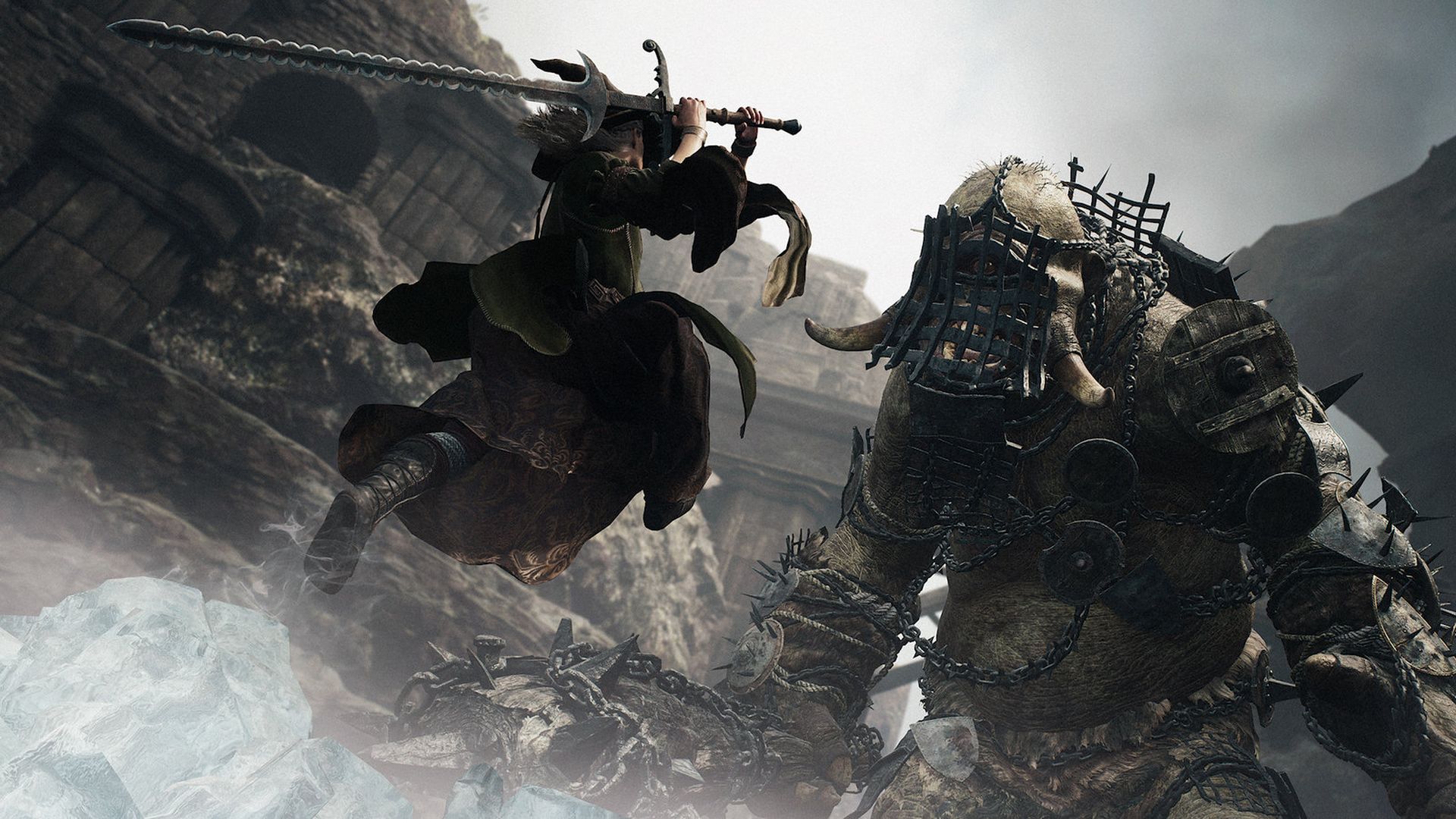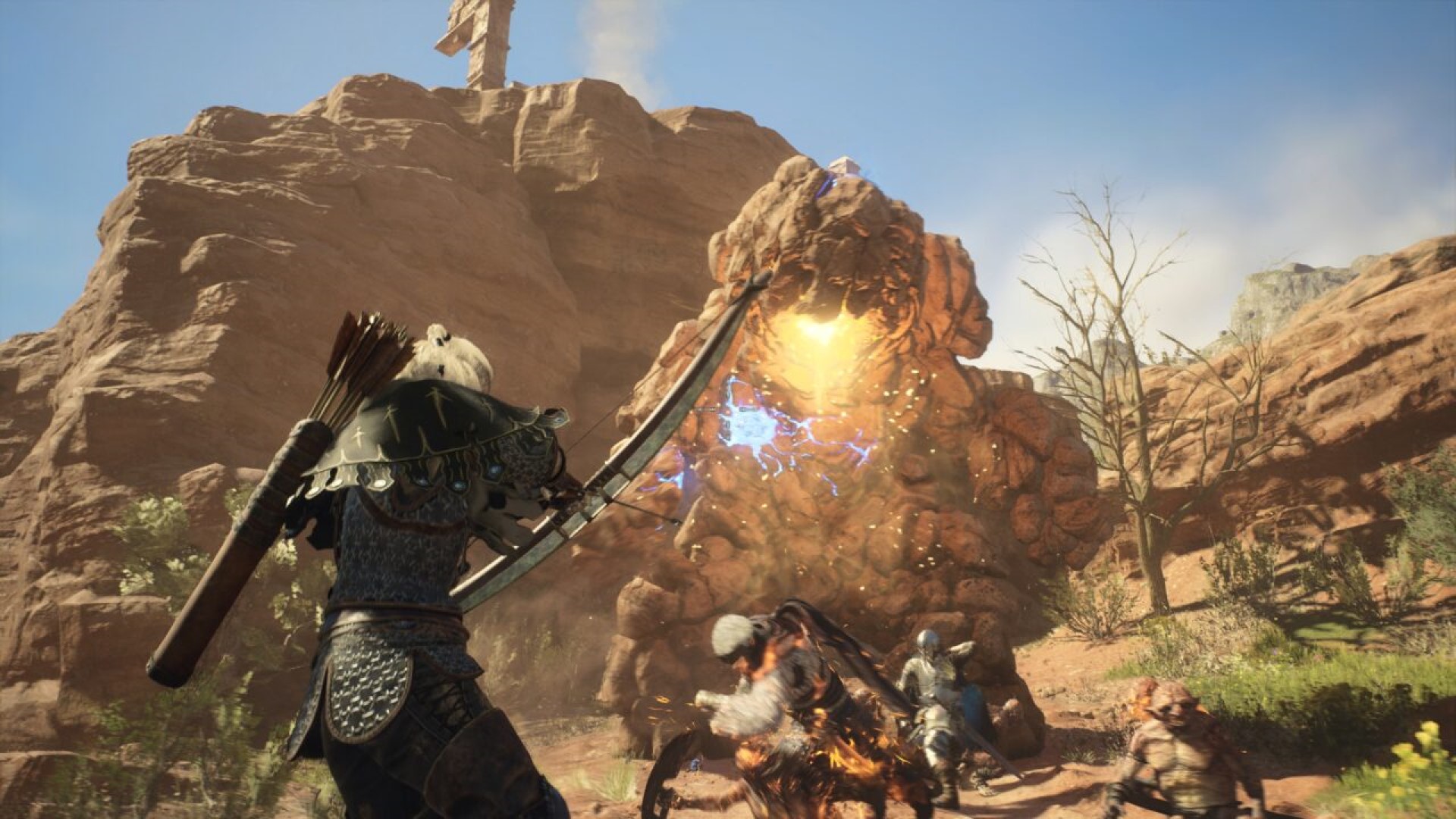
Dragon’s Dogma 2’s developer propelled hype for this nebulous concept last Autumn during an interview with Edge Magazine whereby they declared the game free of scripted events. Encounters aren’t triggered, they said, but the result of the games rules and systems interacting with each other. The event in question involves an encounter with a cave troll which savagely and unexpectedly eradicated his AI companion Pawns. Now hoofing it alone, the developer sought refuge in a nearby village with the troll refusing to give up the chase. They expected the villagers to scatter in panic, with the resulting ruckus affording them the opportunity to escape. What happened next shocked and amazed them – the villagers, instead of showing fear, forge a unified affront against the troll, swarming like honeybees to overwhelm their colossal invader.
Now, before we go on, let’s be clear that emergent gameplay isn’t novel to Dragon’s Dogma 2. It’s been around for years, with many games incorporating emergence into the very fabric of their being. The above example doesn’t sound all that unique to be honest; AI friends attacking an AI foe is bread and butter for open world games in 2024, but the point the developer is trying to make is that the villagers could conceivably have run away themselves, or maybe a handful would stay to fight and die at the hands of the troll. Perhaps the troll could have been intercepted by a swooping griffin before it reached the village, or possibly the villagers were already being ransacked by a troupe of ogres before the developer and troll even arrive.
And what if the developer decided to take on the troll singlehandedly? Reddit is already awash with unique stories; of gamers performing some kind of action and getting an unexpected outcome. Some have discovered the game’s gargantuan foes succumb to head trauma, so maybe the developer could have found higher ground – a ledge or outcrop, perhaps – to hurl them onto the troll akin to Shadow of the Colossus. And then whilst atop a troll’s head, some have ridden the bewildered behemoth as it steps over a precipice, falling to its death whilst they survive with minimal fall damage, finding themselves crash landed in an entirely new area that would have taken hours to reach by other more conventional means.
These ramblings epitomise emergent gameplay. They are the very result of game developers supplying a set of rules that grant players freedom to explore creative solutions to obstacles they encounter. An aversion to fast travel aside, Dragon’s Dogma 2’s developers haven’t set out strict ways in which the game must be played. There’s a framework, sure, but even guiding principles can yield unexpected results like those just mentioned. The trick is to make the game’s tools, mechanics, and player abilities broad enough that divergent strategies can be explored.
The developer is obviously trying to generate sales for Dragon’s Dogma 2 in that Edge Magazine interview, but emergent gameplay appearing so convincingly so that it appears to be a scripted event is pretty cool, whether you’re blown away by the actual event itself or not.
To be clear, emergent gameplay isn’t about there being multiple ways to tackle a certain objective. Imagine a sentry guarding the entrance an outpost. You might choose to take them down guns blazing or opt for a stealthy sneak attack. Maybe you kill them or spare them by creeping past undetected. Maybe you can distract them or find an alternative route inside the outpost altogether. These options present the illusion of choice – something open-ended gameplay does so well – and whilst this isn’t a criticism of those types of games whatsoever all those solutions are baked into the game’s programming. For the gameplay to be truly emergent it must combine open-ended structure with gameplay mechanics that generate specific outcomes unique to the combined components the player has deployed. The result is a more convincingly living, breathing open world, one that appears to exist beyond player actions, but reacts accordingly to their decisions.
Take traversal in Dragon’s Dogma 2. Pure fast travel, whilst available, is prohibitively expensive, requiring rare Ferrystones to instantaneously get from one point on the map to another. The slower, more rudimentary form of autonomous travel is via oxcart, but these road trips invariably run into trouble. Attacks are common, with oxcart riders running the risk of being killed in the ambush, meaning you’ll have to traipse back into town on foot. Should enough oxcart riders be killed then the service will cease altogether. These riders can be revived but much like fast travel they require spending rare and expensive Wakestones.
The game then is steering you towards favouring expeditions on foot, where something unexpected seemingly lurks around every corner. Quest giving NPCs could run up to you, or a band of mythical creatures might be stalking out of sight, hidden by long grass. It’s here, hiking it through wild lands, that the epitome of emergent gameplay reveals itself some more. Players are free to experiment with any of the games 10 vocations – i.e., character classes – that can be swapped on the fly. You can opt to be melee accomplished Fighters, armour-breaking Warriors, magic equipped Mages, a Thief dealing damage via swift, ninja-alike strikes, or an Archer specialising in long-range weapons. Collected augmentations can be swapped between vocations too, giving more license to experiment. Combining this with all the chaotic, unexpected happenstance befalling every expedition, and the fact a fully upgraded vocation feels crazily overpowered, means you’re unlikely to play through Dragon’s Dogma 2 without becoming adept at more than a handful of unique character classes.
These vocation-aligned combat styles extend to the game’s AI controlled Pawn companions too. Employ a warrior Pawn and they might just wade into the thick of the action for you, whilst Mage and Archer Pawns will hang back, preferring to wield their powers from a distance. Some Pawns will have prior knowledge of your mission, offering advice on how best to get around an obstacle; advice which you’re free to ignore, by the way. Some Pawns are fluent in native languages like Elvish, meaning you can converse with the Elves harbouring the Arbour area of the map if you so wish.
Weapons, tools, skills, augmentations, Pawns, vocations – these are the components Dragon’s Dogma 2 gives to you which you can combine in any which way you choose in its evolving open world to complete an objective. The open world’s reluctance to hold your hand, to signpost, to refuse spelling out the solution to you, to not punish mistakes resulting from experimentation but reward you with a world that reacts to your errors, is how Dragon’s Dogma 2 excels with its emergent gameplay. In this regard, it’s akin to a blank canvas, but there are other variables at play too: the game’s day and night cycle, with darkness proving itself far more dangerous, or inclement weather that’ll affect enemy behaviour. More common RPG tropes like dialogue choices and action versus stealth have little bearing here on the open world. Its vast opaqueness might seem impenetrable at first, but patience and experimentation are how you wrangle the best out of it.
Note: The views expressed in this article are those of the author and do not necessarily represent the views of, and should not be attributed to, GamingBolt as an organization.

















